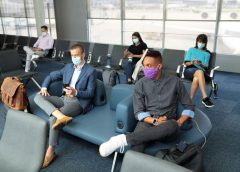
GAO Calls for Federal Leadership on Communicable Diseases in Air Travel
[ad_1]
Concerns about air travel’s role in disease transmission have intensified during the COVID-19 pandemic. Stakeholders say more research involving real-world situations and human behavior is needed and could guide actions to protect public health.
The Government Accountability Office (GAO) says Congress should consider directing the Federal Aviation Administration (FAA) to develop and implement a strategy for research on communicable diseases in air travel, in coordination with other federal agencies and external partners.
Some research has already been conducted since the start of the pandemic. For example, Airbus, Boeing and Embraer issued a joint publication of separate computational fluid dynamics (CFD) research conducted by each manufacturer in their aircraft. While methodologies differed slightly, each detailed simulation confirmed that aircraft airflow systems do control the movement of particles in the cabin, limiting the spread of viruses. This is backed up by findings from a 2020 Department of Defense and United Airlines study which found that passengers wearing masks are at a very low risk of contracting COVID-19 on planes, even during packed flights.
Other research has examined the effect of different airline operations—such as boarding aircraft from back to front—on the risk of disease exposure. However, stakeholders GAO interviewed described the need for more research involving real-world situations and human behavior. Additional research could inform the development of evidence-based mitigation measures, policy, and regulations to protect public health. Stakeholders cited several challenges, particularly the lack of federal leadership to facilitate interdisciplinary research and address gaps, to conducting research on communicable diseases in air travel. Stakeholders said researchers’ inability to access aircraft, airports, or data also poses challenges to performing needed research.
GAO found that several agencies have focused on those research areas most relevant to their priorities and mission. Such agencies include the Department of Health and Human Services (HHS), the Department of Transportation’s FAA, and the Department of Homeland Security (DHS). But the government watchdog found that none of these agencies have undertaken efforts to advance needed research on communicable diseases in air travel more broadly. Officials with each of these agencies said a more coordinated federal approach to identify and advance relevant research could generate valuable information and inform policy development and guidance. In addition, bringing various federal agencies’ assets to bear could link researchers with aviation stakeholders across areas of expertise, provide clearer access to federal funding for research, and help identify needed research across different disciplines.
The FAA acknowledges that it has broad authority to conduct and sponsor research on communicable diseases in air travel, but the agency has historically maintained that this work lies outside its core responsibility for aviation safety. The FAA is of course at this time grappling with 5G, drones and advanced air mobility, all of which affect safety in the national airspace. GAO points out however that the FAA has prior experience conducting and supporting such research, as well as strong aviation industry ties critical to advancing needed research. In particular, GAO notes, FAA has undertaken related research in the past—usually in response to statutory mandates—including work on disease transmission in aircraft cabins. Moreover, the watchdog believes that leading the development of a coordinated strategy would be consistent with FAA’s efforts to develop a national aviation preparedness planin coordination with DHS and HHS, as GAO has repeatedly called for.
It is worth noting that the International Air Transport Association (IATA) has demonstrated the low incidence of inflight COVID-19 transmission. From a total of 1.2 billion passengers, 44 cases of COVID-19 were reported in which transmission is thought to have been associated with a flight journey.
Nevertheless, the COVID-19 pandemic has intensified ongoing concerns about air travel’s role in spreading disease and raised questions about the safety of passengers and crew. More interdisciplinary research, especially involving human behavior and real-world situations, would enable stakeholders to better understand the risks of disease transmission in air travel. Such research could provide insights into the effectiveness of various mitigation measures and inform the development of evidence-based policy and requirements to protect public health.
GAO has determined that the FAA is unlikely to advance this research on its own initiative and is therefore asking Congress to consider directing the FAA to develop and implement a strategy to identify and advance needed research on communicable diseases in air travel, in coordination with appropriate federal agencies, such as DHS and HHS, and external partners. In alignment with leading practices for interagency collaboration, GAO says this strategy should, at a minimum, clearly identify the roles and responsibilities for participating agencies, determine the resources needed, and document any relevant agreements.
Read the full report at GAO
[ad_2]
Source link


